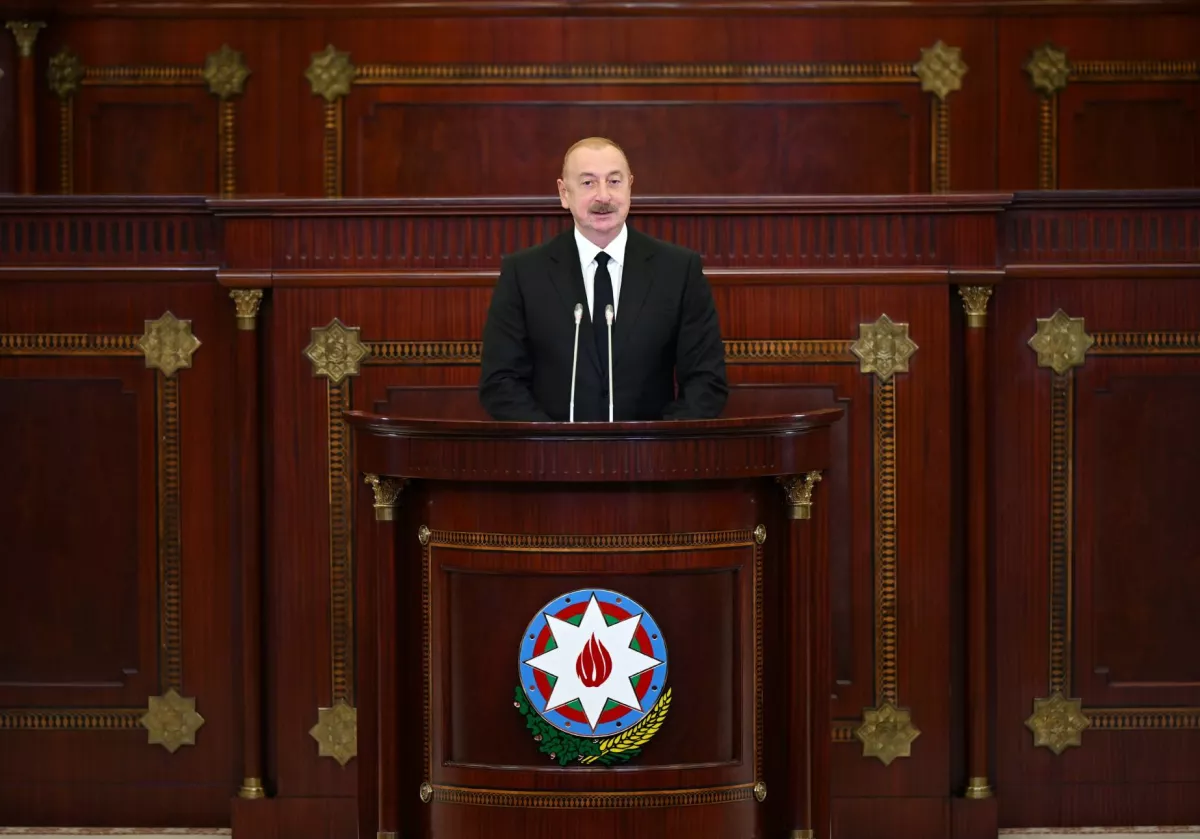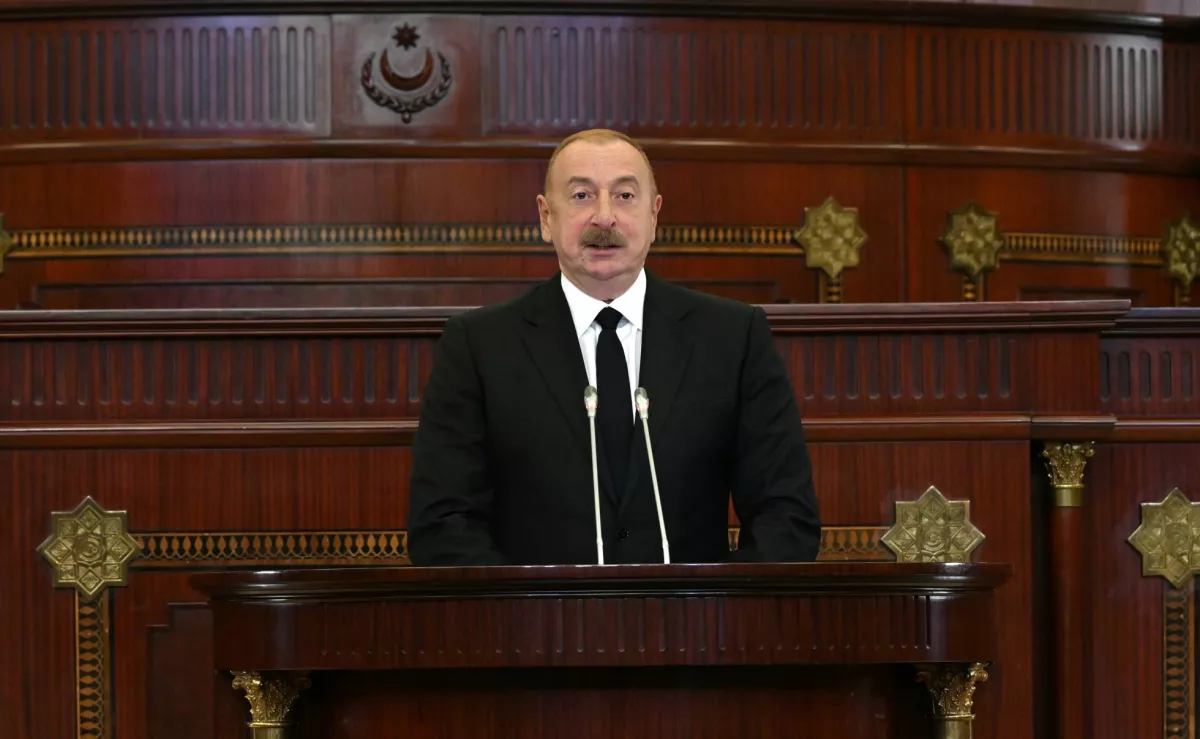Karabakh, economy, social sphere: President Aliyev sets key priorities Caliber.Az review
Azerbaijan's core economic indicators are generally showing positive dynamics, according to President Ilham Aliyev, who addressed a range of foreign and domestic policy issues during the first session of the 7th convocation of the Milli Majlis (National Assembly).
Speaking about GDP growth, particularly in the non-oil sector, the head of state also highlighted steady progress in reducing the country's external debt. President Aliyev further noted positive developments in social policy, specifically announcing an expected increase in the minimum wage and pensions in the coming year.
In contrast to the negative impact of last year's global recession on Azerbaijan's economy, this year has seen notably stronger GDP growth. President Ilham Aliyev, in a detailed address, discussed national security and advancements in the country’s defence sector, highlighted progress in revitalizing the Karabakh and East Zangezur economic regions, and assessed the outlook for Azerbaijan’s economic development. "I think that this year's economic indicators have been positive. In the first eight months, the economy grew by more than 4 per cent, in the non-oil sector it was 7 per cent," the president stated.
It’s important to highlight that, according to September data from the State Statistics Committee, Azerbaijan’s nominal GDP for the period from January to August of this year surpassed 80.96 billion manats ($47 billion), with real growth estimated at 4.3%. Growth in non-oil sectors was nearly double this rate, with industry accounting for almost 38% of the GDP. These are impressive figures, particularly given the high volatility of global hydrocarbon prices, alongside a decline in oil production and exports. Overall, the significance of the non-energy sector has been growing year by year, which is a highly positive factor for the country's economy. While in the first half of 2023, the share of the non-oil sector in the GDP structure was 60%, by the first half of this year, this figure increased to 65.18%.
Despite certain challenges in the external economic environment, the first two-thirds of 2024 have generally been promising for the development of the domestic economy. The level of global risks, including imported inflation, is significantly lower than it has been over the past two years. According to calculations by the Central Bank of Azerbaijan (CBA), inflation this year and next will remain within target levels: annual inflation in 2024 is expected to be 3.5%, and in 2025, 4.2%. These estimates from the regulator are largely in line with forecasts from the World Bank, which predicts annual inflation in Azerbaijan to be 3% in 2024 and 3.5% in 2025.

“We have been reducing our foreign debt year by year on my orders, and today it accounts for only 7.5 per cent of the gross domestic product. We can say that we have repaid almost all the key loans, and if we view our debt in absolute numbers, it is about 5.3 billion dollars. We can repay it in one day. I don't want to compare ourselves to any other country, but let me tell you one figure: in some developed countries, including some countries that want to lecture us, the foreign debt accounts for 100 per cent of the gross domestic product or even higher,” President Aliyev remarked during a speech in parliament.
During the energy crisis from 2014 to 2017, the government adopted a highly conservative approach to external borrowing. This included tightening regulations for state organizations in securing donor funds and establishing clearer obligations for private banks and companies regarding the amount of external funding raised and the terms for repayment. As a result of these measures, Azerbaijan has positioned itself as a leader in the total external debt-to-GDP ratio, not only within the post-Soviet space but also among the best in the Central and Eastern European region over the past decade.
Additionally, Azerbaijan boasts a robust financial safety cushion that enhances stability and mitigates risks associated with the country’s debt obligations. According to the Central Bank of Azerbaijan (CBA), from January to August of this year, the country’s strategic foreign exchange reserves increased by 6.1%, reaching $72.6 billion. This buffer plays a crucial role in maintaining macroeconomic and monetary stability.
The dynamic growth of the domestic economy, particularly in the non-oil sector, and the increase in budget revenues are key to addressing the crucial objectives facing the country, primarily the revival of the territories liberated from occupation and the return of citizens to their homeland. "The amount to be spent by the end of this year is 19 billion manats [$11.1 billion]. Most of the funds is channeled into infrastructure projects. At the same time, efforts are being made to return former IDPs to their homes, and more than 8,000 former IDPs have already resettled in Karabakh and East Zangezur. Their number will increase every month and every year," the president stated.

The government's prudent macroeconomic policy, which has helped reduce inflation rates, stabilize the currency market, and maintain a manageable external debt, provides a solid foundation for continuing sustainable social reforms and increasing budget allocations for wage and social benefit improvements.
“Of course, in order to implement our future plans, including the improvement of the well-being of our citizens, the economy must always develop. We have implemented four packages of social reforms since 2018. The value of this package of social reforms is 7 billion manats and it covers four million people. During the last five years, the minimum wage in Azerbaijan has increased 2.7 times and the minimum pension 2.5 times. I must also inform you that an instruction has already been given that the minimum wage and minimum pension will be increased again from next year,” President Aliyev emphasized.
Government support for vulnerable segments of the population has long been a cornerstone of President Ilham Aliyev's political agenda in Azerbaijan. Between 2019 and 2021, approximately 900 regulatory acts were adopted in Azerbaijan aimed at improving the social welfare of citizens. In January 2023, the fourth social package was enacted, which raised the minimum pension, salaries, and other types of social benefits, providing additional social payments to around 1.9 million people.








